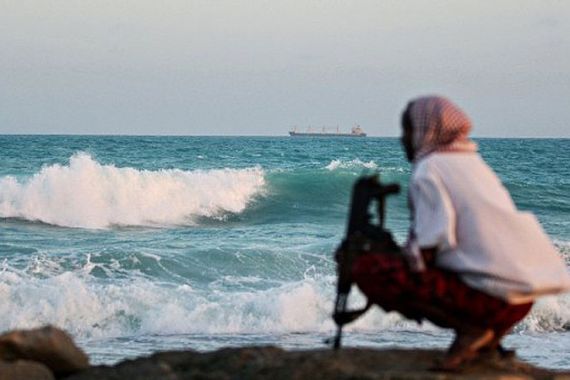EU naval force ‘targets’ Somali pirate bases
Anti-piracy unit raids pirate installations off country’s coast for first time since its mandate was expanded in March.

The European Union’s anti-piracy force has attacked pirate installations on Somalia’s coastline by air for the first time since its mandate was expanded earlier this year.
The attack on what the EU force said was “on known pirate supplies” came four days after Somali pirates hijacked a Greek-owned oil tanker carrying close to a million barrels of crude oil in the Arabian Sea.
“We believe this action by the EU Naval Force will further increase the pressure on, and disrupt pirates’ efforts to get out to sea to attack merchant shipping and dhows,” Rear Admiral Duncan Potts, Operation Commander of the EU Naval Force, said in a statement on Tuesday.
“The focused, precise and proportionate action was conducted from the air and all forces returned safely to EU warships on completion.”
The EU naval force said no Somalis were injured in Tuesday’s attack and that the helicopter returned safely after the operation.
“This kind of action is very carefully considered,” Timo Lange, a spokesman for the EU mission, said.
The EU extended its counter-piracy operation off the coast of Somalia by two years in March, until December 2014, and expanded the area it covers to include the coastline itself.
New mandate
The new mandate allows warships or aircraft to fire at fuel barrels, boats, lorries or other equipment stowed on beaches, but it is not aimed at hitting the pirates themselves. It also bars the deployment of land troops.
Until Tuesday’s attack, it had only operated in Somalia’s territorial and internal waters. But its decision to extend its area of operations to include Somali coastal territory meant it was able to target pirates’ weaponry and other equipment on land.
The EU’s Operation Atalanta has deployed between five and 10 warships off the Somali coast since 2008 to escort humanitarian aid shipments and thwart pirate raids on commercial vessels using the busy sea route.
Several other nations, including Russia and China, also provide protection for their ships as they pass through the busy shipping route through the Gulf of Aden and the Indian Ocean.
Somali attacks cost the world nearly $7bn in 2011, including more than $2bn for military operations, armed guards and equipment to protect ships, according to the US-based Oceans Beyond Piracy monitoring group.
Despite successful efforts to halt attacks in the Gulf of Aden shipping lane, international navies have struggled to contain piracy in the Indian Ocean and Arabian Sea due to the vast distances involved.